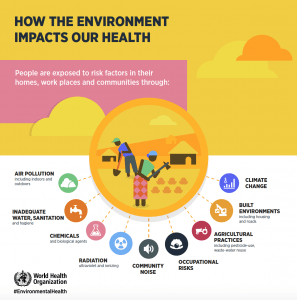Cornell experts: “One Health” is key to life
On March 15, 2016 the World Health Organization (WHO) reported that an estimated 12.6 million deaths each year (roughly one in four) are attributable to diseases caused by living in environments affected by factors such as air pollution, chemicals, and climate change. The report explains that while deaths from have declined, deaths caused by noncommunicable diseases (NCDs) like cancer, heart disease and chronic respiratory disease can be attributed largely to air pollution and account for nearly 8.2 million deaths yearly.
This WHO infographic explains the big picture environmental impacts on health as well as the who, what, when, where, why, and how of the problem.
Dr. Alex Travis, faculty director for the environment at Cornell’s Atkinson Center for a Sustainable Future, and associate professor of reproductive biology and wildlife conservation at Cornell’s Baker Institute for Animal Health, commented on the WHO report and the role that the environment must take in the future of public health policy.
Travis says:
“These statistics highlight how much human health depends on the health of the environment. This is a principle we call ‘One Health.’ The health of humans, animals and the environment all depend on each other. In order for people to remain healthy, we must ensure that our environment remains healthy.
“Preventing human deaths caused by unhealthy environments—those with poor air and water quality, those severely impacted by climate change, those with unsustainable agricultural practices—cannot be approached simply from the traditional medical perspective. We need to tackle these from a One Health and public health approach so that we address the underlying causes of these illnesses as opposed to simply treating symptoms in individual patients.”
These deaths are due to factors that are largely preventable through policy change, often involving multiple countries and diverse disciplinary expertise. To solve these problems, it is important to create integrated policies that address the environment, energy and economic development as a whole and not as independent elements. If air pollution is a leading cause of death, we need to invest in strategies that reduce that environmental risk.”
Wendy Wolford is the faculty director of economic development at Cornell University’s Atkinson Center for a Sustainable Future, professor of development sociology in the College of Agriculture and Life Sciences, and has worked for over fifteen years with the Movimento dos Trabalhadores Rurais Sem Terra, one of the most important grassroots social movements in Latin American history. Wolford commented on how environmental pollution affects rich and poor countries differently.
Wolford says:
“Economic growth particularly in developing countries has too often been achieved at the expense of human health and wellbeing – rapid urbanization and industrialization have resulted in dirty air, water and soil that is silently killing an increasing number of people every day. What are called non-communicable diseases – as opposed to infectious diseases – can be split into two distinct categories: rich and poor.
“People from rich countries often die of non-communicable diseases resulting from lifestyle and diet, while people in poor countries — as the report points out — die of non-communicable diseases resulting from air and water pollution.
“Within poor country non-communicable diseases, there is a further split: in some countries, such as South, Southeast and East Asia, we could label the epidemic one of rapid, reckless growth: industrialization and rapid urbanization are poisoning the water and air in countries once considered to be paragons of development, known as the Asian Tigers; while in other regions, particularly Sub-Saharan Africa, the non-communicable diseases epidemic is one of immense poverty, tainted water and degraded lands.
“Overall, these new forms of pollution and death are directly related to poverty and global inequality.”
This article is based on an article published on March 16, 2016 by the Cornell University Media Relations Office.

